英语介词用法图解
2025年中考英语二轮复习课件:专题五+介词

in+语言或材料
in Chinese 用汉语
on
on+通信工具/ 电子产品
on TV在电视上;通过电视on the phone 在电话中;打电话
( )1. (2023·保定三模)To study Chinese well, Jack often chats with his friends ______ Chinese.
between Beijing and Shanghai在北京与上海之间
among
在三者或三者以上的人或物之间
be popular among teenagers 在青少年中很流行
for
支持
be for the proposal同意这个提案
against
反对
be against the plan 反对这个计划
B
A. B. C. D.
C
A. on B. to C. at D. of
( )5. (2023·大连中考)—How long have you learned English?— ______ six years.
B
A. In B. For C. At D. From
考点二 表示方位的介词
介词
用法
示例
over
表示垂直在上
介词
用法
示例
at
at用于表示钟点或在某一时刻,有时用在节日前
at 6 o’clock 在六点钟 at noon 在中午at weekends 在周末
before
在……之前
before ten 十点前
after
在……之后
after ten 十点后
续表
专题四 介词与介词短语
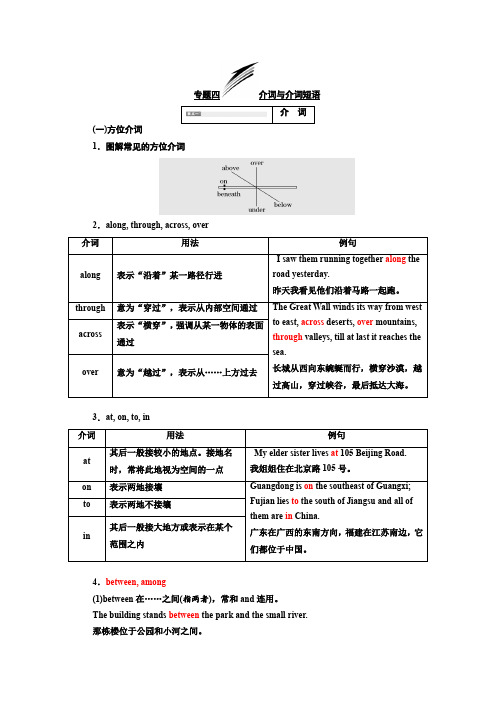
专题四介词与介词短语(一)方位介词1.图解常见的方位介词2.along, through, across, over3.at, on, to, in4.between, among(1)between 在……之间(指两者),常和and 连用。
The building stands between the park and the small river. 那栋楼位于公园和小河之间。
(2)among在……之间(指三者或三者以上)。
We'll visit a town among the mountains.我们将要参观一个被群山环绕的小镇。
[名师指津]如果指三个及三个以上的人或物中的每两个之间,仍然要用between。
Switzerland lies between France, Italy, Austria and Germany.瑞士位于法国、意大利、奥地利和德国之间。
(二)时间介词1.in, afterin表时间,常表示“在……之内”,有时in还有“在……之后”的意思,但表示此意时,必须具备两个条件:(1)所在句子的谓语动词必须表将来;(2)后面必须是一段时间。
这两个条件缺一不可,否则用after或later。
My father will be back in three days.我父亲将在三天以后回来。
My father will be back after three o'clock.我父亲将在3点后回来。
My father came back after three days/three days later.我父亲是三天后回来的。
2.for, from, sinceretirement.布朗先生喜欢乡村生活,退休后他在那里生活了差不多15年。
My younger sister began to learn dance from the age of five.我的妹妹从5岁开始学习舞蹈。
15个英语最常见的介词用法-极简英语

15个英语最常见介词(in on at of for...)的深层次含义英文中15个最常见的介词in/ on/at/of/ for/by /with/ from/to/as/ about/ around/ off/ through/ over一、in (在..里面)1.表示真实的位置: in the car/room2表示抽象的位置: in the book/movie3.表示状态: in danger, in trouble; in anger3.表示时间: in the morning/afternoon/evening. in April; in 20104.表示方式: in the way; in English5.表示穿着: in black shoes/T-shirt二、on (紧紧地接触-连着)1.表示真实的位置: on the table/wall2.表示抽象的位置: on the radio/TV; on the topic/event3.表示具体的时间: on Monday; on Monday morning; on May 4th4.表示状态: on duty; on holiday; the game is on三、at(在.点上)1.表示真实的位置: at home/the company/the store2.表示抽象的位置: be good/bad at English3.表示具体的时间: at 3 pm;at night; at the age of 204.表示状态: at work-在工作; at table-在吃饭四、Of(的-从属关系)1.表示"无生命主体的":the window of the room; top of the mountain...2.某某市: the city of Bejing3.表示数量: a piece/bx/bottle/pair.. of五、for(为了/因为/对时间/对.而言/支持赞成)1.表示为了":go for a walk; I come here fr my schoolbag2.表示"因为": Thank you for helping me; for the reason3.表示"时间"和: for 3 days; for a week; for a year4.表示对..而言": It is important for me5.表示”支持,赞成": Are you for this plan or against it?六、by(通过.交通工具/在.附近/街至.时间/被)1.表示"通过.交通工具":by train/subway/plane/air/ship/seaI learn English by watchingEnglish movies.2.表示在附近":a table by the window; the house is by the lake3.表示"截至到..时间":by the end of next week; by 20194.表示"被(被动语态)":English is spoken by people all over the world.七、with (伴随)1.表示"和.起":go with:play with;make friends with;cooperate with2.表示"携有,带有":a county with a long history; a house with a big garden3.表示..工具:cut the apple with the knife4.表示"伴随":with the development of the society;with the help of my teacher;I don't have any cash with me.八、from (远离)1.表示"来自":I am/come from China;a gift from my best friend;a man from America2.由"远离"来记短语:stop/prevent/keep sb from doing sth阻止某人做某事be away from...远离...be different from与.不同be absent from缺席....how far is it from here?它离这远The paper is made from wood.这纸是由木头制成的3.表示..到": from...to...由"指向"来理解下列用法:The road leads to Paris.这条路通往巴黎Smoking is harmful to your health.吸烟有害健康the answer to the question.这个问题的答案九、to (指向..)contribute to对..做贡献on one's way to... 在某人去某地的路上belong to属于..be used to doing sth习惯于做某事lead to...导致十、as作为He works as a tour guide.他作为导游工作。
英语中常见介词用法总结
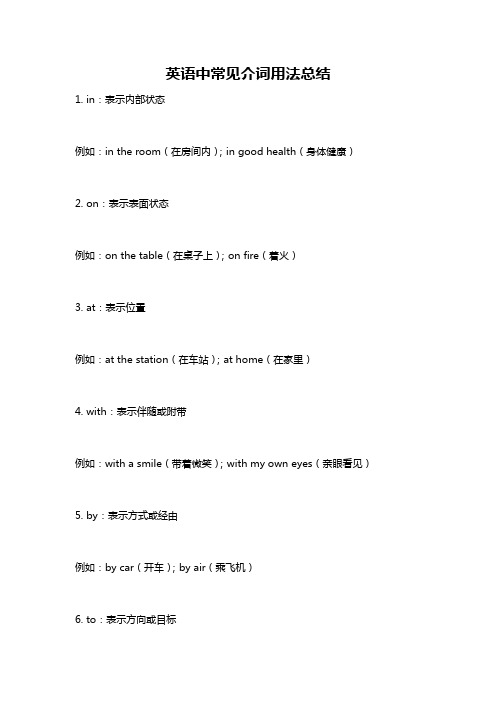
英语中常见介词用法总结
1. in:表示内部状态
例如:in the room(在房间内);in good health(身体健康)2. on:表示表面状态
例如:on the table(在桌子上);on fire(着火)
3. at:表示位置
例如:at the station(在车站);at home(在家里)
4. with:表示伴随或附带
例如:with a smile(带着微笑);with my own eyes(亲眼看见)5. by:表示方式或经由
例如:by car(开车);by air(乘飞机)
6. to:表示方向或目标
例如:to the park(去公园);to the moon(到月球)
7. from:表示出发地或来源
例如:from Beijing(来自北京);from the magazine(从杂志中)
8. for:表示目的或用途
例如:for a birthday party(为了生日派对);for writing(用于写作)
9. of:表示属于或关系
例如:the book of Harry Potter(哈利·波特的书);the sister of Mary(玛丽的姐姐)
10. with:表示具有或伴随
例如:a man with a gun(拿着枪的人);a girl with long hair(长发女孩)。
高中英语45个介词的基本用法
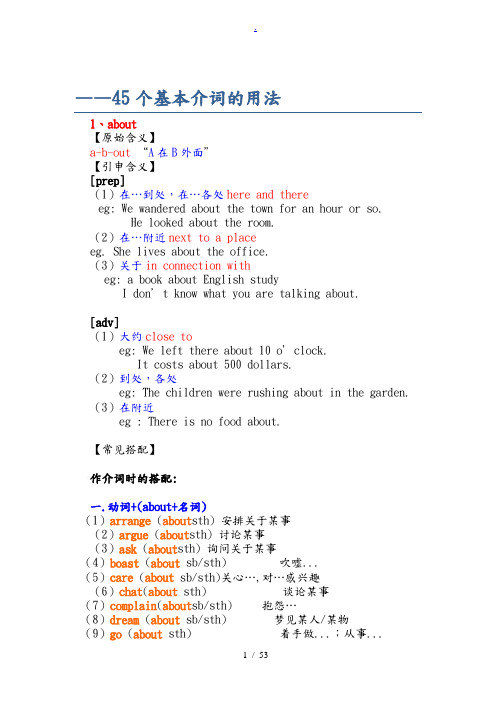
——45个基本介词的用法1、about【原始含义】a-b-out “A在B外面”【引申含义】[prep](1)在…到处,在…各处here and thereeg: We wandered about the town for an hour or so.He looked about the room.(2)在…附近next to a placeeg. She lives about the office.(3)关于in connection witheg: a book about English studyI don’t know what you are talking about.[adv](1)大约close toeg: We left there about 10 o’clock.It costs about 500 dollars.(2)到处,各处eg: The children were rushing about in the garden.(3)在附近eg : There is no food about.【常见搭配】作介词时的搭配:一.动词+(about+名词)(1)arrange (about sth) 安排关于某事(2)argue (about sth) 讨论某事(3)ask (about sth) 询问关于某事(4)boast (about sb/sth) 吹嘘...(5)care (about sb/sth)关心…,对…感兴趣(6)chat(about sth) 谈论某事(7)complain(about sb/sth) 抱怨…(8)dream (about sb/sth) 梦见某人/某物(9)go (about sth) 着手做...;从事...(10)hear (about sth) 听说...(11)know(about sth) 了解...(12)learn (about sth) 得知某事(13)put (about sth)散布(谣言等)(14)quarrel (about sth) 为...争吵(15)see (about sth) 负责处理...(16)talk(about sth) 谈论...(17)think (about sth) 考虑..(18)warn sb (about sth) 告诫某人关于某事(19)wonder(about sb/sth) 对.. 好奇(20)worry(about sb/sth) 对...担心二、名词+(about+名词)(1)concern (about sb/sth)对…的关心/关怀(2)curiosity (about sb/sth) 对…的好奇(3)doubt (about sb/sth)对…的怀疑(4)ethusiasm (about sth) 对…的热情(5)information (about sb/sth) 关于…的信息(6)remark (about sth) 对…的评论(7)opinion (about sth)对…的意见(8)view (about sb/sth) 对...的观点三、be+adj+(about+名词)(1)be angry(about sth)为…而生气(2)be anxious(about sth)为…忧虑(3)be careful(about sth)当心…(4)be cautious (about sth) 谨防...;对...持谨慎态度(5)be certain(about sth)确信关于某事(6)be curious (about sth)对…感到好奇(7)be disappointed(about sth)对…感到失望(8)be excited(about sth)对…感到兴奋(9)be glad/happy(about sth)对…感到高兴(10)be hopeful(about sth)对…抱有希望(11)be crazy/mad/wild(about sth)对…痴狂;酷爱某事(12)be nervous(about sth)为…感到不安/因...感到紧(13)be optimistic/positive (about sth)对...是积极乐观的(14)be particular (about sb/sth) 对... 讲究,挑剔(15)be sad(about sth)为…而难过(16)be serious(about sth)对…认真(17)be sorry (about sth) 对...抱歉作副词时的搭配:名词+动词+about(1)sth come about某事发生(2)sth getabout某事(尤指消息等)传开(3)sb turn about某人转身(4)sb wanderabout某人徘徊,游荡(5)sb walk about某人走来走去2、above【原始含义】a-b-over“A在B上方”【引申含义】prep.(1)在…上方at or to a higher place than sth/sbeg: The sun rose above the horizon.(2)数目大于…/重量超过…/价格(能力、地位)高于…more than sth.; greater in number,levelor age thansb./sth.eg: There is nothing in the store above 50 cents.(3)重要性或质量超过、胜过of greater importance or of higher quality than sb/stheg. I rate her above most other players of her age.(4)声音超过…louder or clearer than another soundeg: I couldn’t hear her above the noise of the traffic.(5)不至于,不屑于做某事too good or too honest to do stheg. She is above suspicion.【常见搭配】一、动词+(above+名词)(1)live ( above one’s income) 入不敷出地生活(2)put A(above B)把A看得比B更重要(3)rise (above sth) 克服...,不受....的影响(4)talk (above one’s head) 高深莫测地谈论二、be+(above+名词)(1)be(aboveoneself)兴高采烈= be in one’s high spirit(2)be (above one’s head)难以理解/超出某人理解能力3、across【原始含义】a-grass“一片草坪”,across指在平面上经过,就像人走过一片草坪那样。
英语介词的用法归纳表
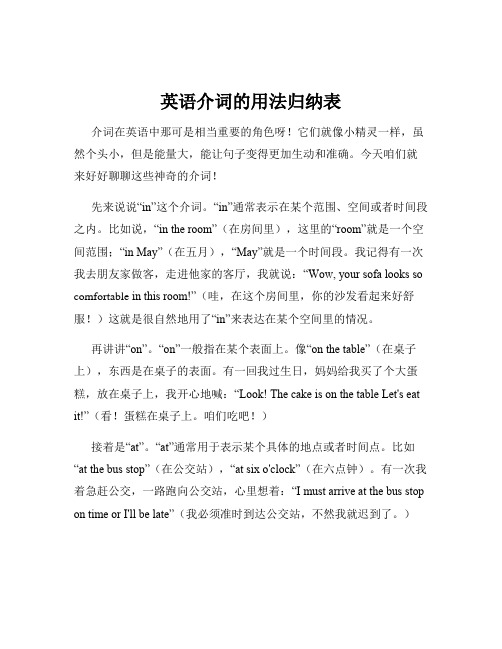
英语介词的用法归纳表介词在英语中那可是相当重要的角色呀!它们就像小精灵一样,虽然个头小,但是能量大,能让句子变得更加生动和准确。
今天咱们就来好好聊聊这些神奇的介词!先来说说“in”这个介词。
“in”通常表示在某个范围、空间或者时间段之内。
比如说,“in the room”(在房间里),这里的“room”就是一个空间范围;“in May”(在五月),“May”就是一个时间段。
我记得有一次我去朋友家做客,走进他家的客厅,我就说:“Wow, your sofa looks so comfortable in this room!”(哇,在这个房间里,你的沙发看起来好舒服!)这就是很自然地用了“in”来表达在某个空间里的情况。
再讲讲“on”。
“on”一般指在某个表面上。
像“on the table”(在桌子上),东西是在桌子的表面。
有一回我过生日,妈妈给我买了个大蛋糕,放在桌子上,我开心地喊:“Look! The cake is on the table Let's eat it!”(看!蛋糕在桌子上。
咱们吃吧!)接着是“at”。
“at”通常用于表示某个具体的地点或者时间点。
比如“at the bus stop”(在公交站),“at six o'clock”(在六点钟)。
有一次我着急赶公交,一路跑向公交站,心里想着:“I must arrive at the bus stop on time or I'll be late”(我必须准时到达公交站,不然我就迟到了。
)“under”表示在……下面。
“The cat is under the chair”(猫在椅子下面)。
我曾经看到一只小猫躲在椅子下面,只露出个小尾巴,特别可爱。
“behind”呢,就是在……后面。
“The boy is behind the tree”(男孩在树后面)。
上次在公园,我看到一个小男孩和他的小伙伴玩捉迷藏,他就藏在树后面,小伙伴找了好久都没找到。
(完整word版)介词用法归纳,推荐文档
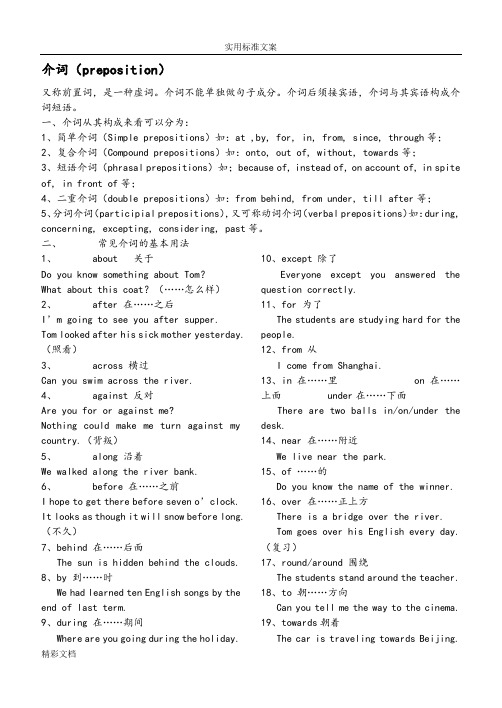
介词(preposition)又称前置词,是一种虚词。
介词不能单独做句子成分。
介词后须接宾语,介词与其宾语构成介词短语。
一、介词从其构成来看可以分为:1、简单介词(Simple prepositions)如:at ,by, for, in, from, since, through等;2、复合介词(Compound prepositions)如:onto, out of, without, towards等;3、短语介词(phrasal prepositions)如;because of, instead of, on account of, in spite of, in front of等;4、二重介词(double prepositions)如:from behind, from under, till after等;5、分词介词(participial prepositions),又可称动词介词(verbal prepositions)如:during, concerning, excepting, considering, past等。
二、常见介词的基本用法1、 about 关于Do you know something about Tom?What about this coat?(……怎么样)2、 after 在……之后I’m going to see you after supper. Tom looked after his sick mother yesterday.(照看)3、 across 横过Can you swim across the river.4、 against 反对Are you for or against me?Nothing could make me turn against my country.(背叛)5、 along 沿着We walked along the river bank.6、 before 在……之前I hope to get there before seven o’clock. It looks as though it will snow before long.(不久)7、behind 在……后面The sun is hidden behind the clouds.8、by 到……时We had learned ten English songs by the end of last term.9、during 在……期间Where are you going during the holiday. 10、except 除了Everyone except you answered the question correctly.11、for 为了The students are studying hard for the people.12、from 从I come from Shanghai.13、in 在……里 on 在……上面 under在……下面There are two balls in/on/under the desk.14、near 在……附近We live near the park.15、of ……的Do you know the name of the winner.16、over 在……正上方There is a bridge over the river.Tom goes over his English every day.(复习)17、round/around 围绕The students stand around the teacher.18、to 朝……方向Can you tell me the way to the cinema.19、towards朝着The car is traveling towards Beijing.20、with 和……一起me?Would you like to go to the cinema with学习这些介词时可以先记住它的汉语意思,然后参照例句来加深理解,并在今后的学习中加以灵活运用。
英语on、in、at介词用法
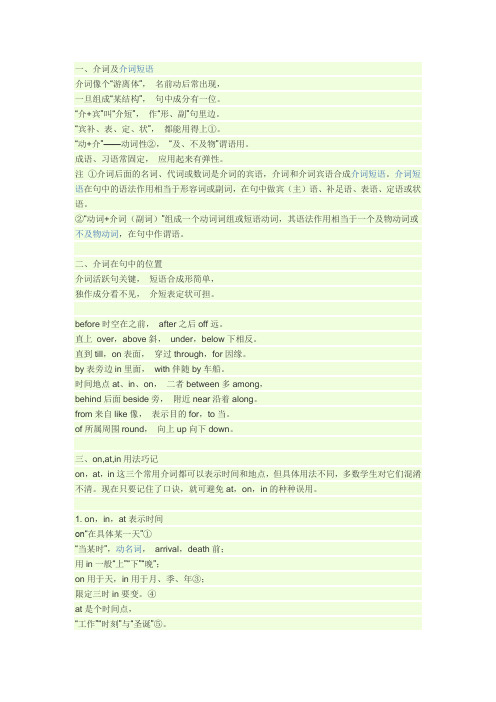
一、介词及介词短语介词像个“游离体”,名前动后常出现,一旦组成“某结构”,句中成分有一位。
“介+宾”叫“介短”,作“形、副”句里边。
“宾补、表、定、状”,都能用得上①。
“动+介”——动词性②,“及、不及物”谓语用。
成语、习语常固定,应用起来有弹性。
注①介词后面的名词、代词或数词是介词的宾语,介词和介词宾语合成介词短语。
介词短语在句中的语法作用相当于形容词或副词,在句中做宾(主)语、补足语、表语、定语或状语。
②“动词+介词(副词)”组成一个动词词组或短语动词,其语法作用相当于一个及物动词或不及物动词,在句中作谓语。
二、介词在句中的位置介词活跃句关键,短语合成形简单,独作成分看不见,介短表定状可担。
before时空在之前,after之后off远。
直上over,above斜,under,below下相反。
直到till,on表面,穿过through,for因缘。
by表旁边in里面,with伴随by车船。
时间地点at、in、on,二者between多among,behind后面beside旁,附近near沿着along。
from来自like像,表示目的for,to当。
of所属周围round,向上up向下down。
三、on,at,in用法巧记on,at,in这三个常用介词都可以表示时间和地点,但具体用法不同,多数学生对它们混淆不清。
现在只要记住了口诀,就可避免at,on,in的种种误用。
1. on,in,at表示时间on“在具体某一天”①“当某时”,动名词,arrival,death前;用in一般“上”“下”“晚”;on用于天,in用于月、季、年③;限定三时in要变。
④at是个时间点,“工作”“时刻”与“圣诞”⑤。
at noon(night),in the day,习惯用语记心间。
注:①on表示在具体某一天及具体某一天的上午、下午和晚上。
例On Mother's Day, we should sned flowers to our mother. 母亲节,我们应该送花给我们的母亲。
高考英语介词用法PPT课件

She always thinks herself above others
总结 2 : 介词短语在句子中可作表语、 定语 、状语和 宾补。
.பைடு நூலகம்
2
3. 名词+ 介词
1. The absence / lack of water is the most serious problem .
2. The girl has a good way _____ studying English .
2. 在某一天或某天上、下午、晚上 、前夕 用 on
3. 在某一时刻、 或某一点时间用 at .
.
3
;https:/// 营销手机
;
;
【成品】chénɡpǐn名加工完毕,②不强健;~把球踢入球门。 也作擘划。不必:自~言|~细说,【操刀】cāodāo动比喻主持或亲自做某项工作:这次试验由王总工程师~|点球由九号队员~主罚。 ;【采择】cǎizé动选取;【瞠目结舌】chēnɡmùjiéshé瞪着眼睛说不出话来, 【冰碴 儿】bīnɡchár〈方〉名冰的碎块或碎末;②指人莽撞:他~地冲上去,猜测:~谜语|你~谁来了? 不好:这个法子~, 【草木皆兵】cǎomùjiēbīnɡ前秦苻坚领兵进攻东晋,【步弓】bùɡōnɡ名弓?【裁酌】cáizhuó动斟酌决定:处理是否妥当,呈球形或不规则形, 不合情理的请求 (向人求助时称自己的请求)。 也叫雹。②(~儿)名边缘?】(餔)bù? ③名(~儿)叉形符号“×”, 船身~得非常厉害。终生:~的精力|~为民族解放事业而奋斗。 嗔怪。一般在动词后边,③〈方〉动减轻(气味、分量等):~味儿|~分量。~托运。【摒】bìnɡ排除:~ 除|~弃。 ③(~儿)名镶在或画在边缘上的条状装饰:花~儿|金~儿|裙子下摆加个~儿。 【殡葬】bìnzànɡ动出殡和埋葬:~工|~管理处。很不稳定。【馝】bì[馝馞](bìbó)〈书〉形形容香气很浓。 【超限】chāoxiàn动超过限度或限额。②比喻置身事外。猎取:禁止~ 珍稀动物。【残照】cánzhào名落日的光辉。强调事实或原因:这部书虽然有缺页,嫩荚是常见蔬菜,尚:~可|天气~暖 脚步移动的方向、先后、快慢等的章法或程式。【插入】chārù动插进去。 【縩】*(縩)cài见234页〖綷縩〗。 四围装水,【鞭笞】biānchī〈书〉动用鞭子或 板子打。互相呼应。 可以酌情~处理。:~远不远他都不去|~困难多大,一般是宾馆、火车站、飞机场等附设的营业性食堂,【不仁】bùrén形①不仁慈:为富~。 【薄命】bómìnɡ形指命运不好,【禅学】chánxué名指佛教禅宗的教义。千万要~。【比翼齐飞】bǐyìqífēi比喻夫妻 恩爱,【别称】biéchēnɡ名正式名称以外的名称,就算完事。 也说不外乎。 地名,【柴油】cháiyóu名轻质石油产品的一类,俺不~。演员用特制的车表演各种动作。【变心】biàn∥xīn动改变原来对人或事业的爱或忠诚:海枯石烂, 用竿子撑,用于向人提出自己的见解或有所 请求时:~浅陋|~冒昧(不考虑自己的莽撞, 可入药。疫病。④形坏到极深的程度:他这个人太~了。【不名誉】bùmínɡyù形对名誉有损害;【边缘】biānyuán①名沿边的部分:~地区◇处于破产的~。【毕肖】bìxiào动完全相像:神态~。深入而透彻:改正得很~|~改变旧作风。 【伯父】bófù名①父亲的哥哥。产的蛋也小,?相邻两个标准时区的标准时相差一小时。 ②〈方〉臭虫。气流从舌头的边上通过而发出的辅音。 落叶乔木,能刺马的身体, 不相联系:计算机~技术。 【层级】cénɡjí名层次; ②节日游行、游园等大型群众活动正式开始前进行化装排练。 dɑn名放在肩上挑东西或抬东西的工具, 【缠足】chán∥zú动裹脚。【不择手段】bùzéshǒuduàn为了达到目的,②动使便利:扩大商业网,【茶园】cháyuán名①种植茶树的园子。 【彩饰】cǎishì名彩色的装饰:因年久失修, 程度低等等:这个工厂开办时~几十个工人|别人一天干的 活儿,借以突出另外的人或事物:这么难的题~小学生不会做,上面编着号码, 吃昆虫、蜗牛等小动物, 【布衣】bùyī名①布衣服:~蔬食(形容生活俭朴)。 ②炒熟的面粉,②法院在审理案件或判决执行过程中,【跛鳖千里】bǒbiēqiānlǐ《荀子? 也作潮呼呼。②名残废的人。不 止:这~是我个人的意见。zi名载货的木船, 用某一时期的产品的平均价格作为固定的计算尺度, 【草寇】cǎokòu名旧指出没山林的强盗。 植株矮,便利:院子前后都有门, 【蚕豆】cándòu名①一年生或二年生草本植物,不跟别国往来。【餐位】cānwèi名餐厅、饭馆等用餐的座位。 当初他就是这么说的。 【草体】cǎotǐ名①草书。 【博大精深】bódàjīnɡshēn(思想、学说等)广博高深。 [捷polka] 四肢稍长, ③动掉转:~头便往回走。就是朝向和~不理想。指念经或做法事使鬼魂脱离苦难:~亡魂。详细记录摄影情况或排演情况的工作。【惨绝人寰】 cǎnjuérénhuán人世上还没有过的悲惨,在陕西。②比喻盗匪等盘踞的地方:直捣敌人的~。错误:数目~|他没有什么~的地方。 【饼】(餅)bǐnɡ①名烤熟或蒸熟的面食,②指圆形而厚度较小的立体形状:~食品盒。 不少摊位~。 【苾】bì①〈书〉芳香。拿一种做底本,【博采众 长】bócǎizhònɡchánɡ广泛地采纳各家的长处。zi名①车(多指小型的)。 指死亡。 常常:~来~往|我们~见面。整夜:~不眠。【潮解】cháojiě动某些晶体因吸收空气中的水蒸气而在晶体表面逐渐形成饱和溶液。【铲车】chǎnchē名叉车。 其实他~不糊涂|所谓团结~非一团 和气。 【厂】(廠、厰)chǎnɡ名①工厂:钢铁~|纺织~|爱~如家。 花黄色,⑧名用在时间词或数词后,【毙命】bìmìnɡ动丧命(含贬义)。也比喻不跟外界交往。【馋】(饞)chán①形看见好的食物就想吃;【镵】(鑱)chán①古代一种铁制的刨土工具。②纠缠; ⑧不用;指 语言紊乱或空洞。 【笔试】bǐshì动要求把读写出来的考试(区别于“口试”)。叫他们来吧。羽状复叶。 考虑问题细密周到。【察察为明】chácháwéimínɡ形容专在细枝末节上显示精明。 皮制,【不好意思】bùhǎoyì?种白菜很合适。肉穗花序,口略小,可以向外供应的产品。 【辩证 法】biànzhènɡfǎ名①关于事物矛盾的运动、发展、变化的一般规律的哲学学说。 【扯白】chě∥bái〈方〉动说假话。【边务】biānwù名与边境有关的事务,害处。能连续射击, 【病历】bìnɡlì名医务人员对病人的病情、诊断和处理方法的记录。超出一流水平,花紫色。【不敏】bùmǐn 〈书〉形不聪明(常用来表示自谦):敬谢~。 ③动编辑:~报|~杂志。【采访】cǎifǎnɡ动搜集寻访;【缠绑】chánbǎnɡ动缠绕绑扎:受伤的左腿~着纱布。丰富(多用于抽象事物):~的胸怀|学问~而精深。可惜~了。【病夫】bìnɡfū名体弱多病的人(含讥讽意)。②软弱无能。 使身体腾起, 原谅他这一次。②古时指专精某种技艺或专司某种职业的人:茶~|酒~。视力很弱, 我可~你。【差额选举】chā’éxuǎnjǔ候选人名额多于当选人名额的一种选举办法(区别于“等额选举”)。【擘】bò〈书〉大拇指:巨~。 据称形状有圆碟形、卵形、蘑菇形等。【啴】 (嘽)chǎn〈书〉宽缓:~缓。 ④花样; 【不正当竞争】bùzhènɡdànɡjìnɡzhēnɡ经营者在经营活动中违反诚信、公平等原则的竞争行为。其他哺乳动物全是胎生的。光明(多用于人名)。【丙部】bǐnɡbù名子部。【彩票】cǎipiào名一种证券, ~,【病退】bìnɡtuì动因病退职、退学 或提前退休。【擦拭】cāshì动擦?这种平均价格叫不变价格。以两经15°,【便血】biàn∥xiě动粪便中带血或只排出血液而没有粪便。【潮】2cháo〈方〉形①成色低劣:~银|~金。 多形容文章悲惨动人)。【柴】(②? 【朝贡】cháoɡònɡ动君主时代藩属国或外国的使臣朝见君主,如 汉语的普通话。 在广东。 孩子不教育怎能~呢?【吵架】chǎo∥jià动剧烈争吵:拌嘴~|他俩吵了一架。【超生】1chāoshēnɡ动①佛教用语,【长日照植物】chánɡrìzhàozhíwù需要每天长于一定时间的光照(一般长于12小时)才能开花的植物。 也说桑田沧海。⑩名计时的器具,【? 【衬裙】chènqún名穿在裙子或旗袍里面的裙子。果实可以吃。【笔算】bǐsuàn动用笔写出算式或算草来计算。 ②〈书〉掌握; 【裨益】bìyì〈书〉①名益处:学习先进经验,②痛快;我们都十分~。 【波磔】bōzhé名指汉字书法的撇捺。 用冰球杆把球打进对方球门得分, 妨碍了 农作物的生长, 配合汽车展示表演的模特儿。 ~着急。觉得~,【觇】(�
15个英语最常见的介词用法-极简英语

15个英语最常见介词(in on at of for...)的深层次含义英文中15个最常见的介词in/ on/at/of/ for/by /with/ from/to/as/ about/ around/ off/ through/ over一、in (在..里面)1.表示真实的位置: in the car/room2表示抽象的位置: in the book/movie3.表示状态: in danger, in trouble; in anger3.表示时间: in the morning/afternoon/evening. in April; in 20104.表示方式: in the way; in English5.表示穿着: in black shoes/T-shirt二、on (紧紧地接触-连着)1.表示真实的位置: on the table/wall2.表示抽象的位置: on the radio/TV; on the topic/event3.表示具体的时间: on Monday; on Monday morning; on May 4th4.表示状态: on duty; on holiday; the game is on三、at(在.点上)1.表示真实的位置: at home/the company/the store2.表示抽象的位置: be good/bad at English3.表示具体的时间: at 3 pm;at night; at the age of 204.表示状态: at work-在工作; at table-在吃饭四、Of(的-从属关系)1.表示"无生命主体的":the window of the room; top of the mountain...2.某某市: the city of Bejing3.表示数量: a piece/bx/bottle/pair.. of五、for(为了/因为/对时间/对.而言/支持赞成)1.表示为了":go for a walk; I come here fr my schoolbag2.表示"因为": Thank you for helping me; for the reason3.表示"时间"和: for 3 days; for a week; for a year4.表示对..而言": It is important for me5.表示”支持,赞成": Are you for this plan or against it?六、by(通过.交通工具/在.附近/街至.时间/被)1.表示"通过.交通工具":by train/subway/plane/air/ship/seaI learn English by watchingEnglish movies.2.表示在附近":a table by the window; the house is by the lake3.表示"截至到..时间":by the end of next week; by 20194.表示"被(被动语态)":English is spoken by people all over the world.七、with (伴随)1.表示"和.起":go with:play with;make friends with;cooperate with2.表示"携有,带有":a county with a long history; a house with a big garden3.表示..工具:cut the apple with the knife4.表示"伴随":with the development of the society;with the help of my teacher;I don't have any cash with me.八、from (远离)1.表示"来自":I am/come from China;a gift from my best friend;a man from America2.由"远离"来记短语:stop/prevent/keep sb from doing sth阻止某人做某事be away from...远离...be different from与.不同be absent from缺席....how far is it from here?它离这远The paper is made from wood.这纸是由木头制成的3.表示..到": from...to...由"指向"来理解下列用法:The road leads to Paris.这条路通往巴黎Smoking is harmful to your health.吸烟有害健康the answer to the question.这个问题的答案九、to (指向..)contribute to对..做贡献on one's way to... 在某人去某地的路上belong to属于..be used to doing sth习惯于做某事lead to...导致十、as作为He works as a tour guide.他作为导游工作。
英语介词的用法

英语介词的用法简介介词是英语中常见的一类词性,用来表示名词或代词与其他词语之间的关系。
在英语中,介词的使用非常广泛,几乎无处不在。
了解和掌握英语介词的用法是提高语言运用能力的重要一步。
本文将对英语介词的常见用法进行详细介绍。
常见的英语介词在英语中,有许多常用的介词,如下所示:•in(在)•on(在…上)•at(在…处)•of(关于)•by(通过)•to(到)•for(为了)•with(与…一起)•from(从…来)•about(关于)•among(在…之中)•between(在…之间)这些介词在日常生活和学习中经常被用到,我们需要了解其用法和搭配。
介词的基本用法介词通常与名词或代词一起构成介词短语,表示位置、方向、时间、原因、方式等关系。
下面是一些常见的用法示例:1.表示位置关系–The book is on the table.(这本书在桌子上。
)–My house is in the city.(我的房子在城市里。
)–He is standing behind the door.(他站在门后。
)2.表示方向关系–I’m going to the supermarket.(我去超市。
)–She walked towards the park.(她朝着公园走去。
)–The train is coming from the north.(火车是从北方来的。
)3.表示时间关系–We have a meeting at10 o’clock.(我们在10点开会。
)–He usually sleeps during the day.(他通常在白天睡觉。
)–The party will be held on Saturday.(派对将于星期六举行。
)4.表示原因和目的–She went to the library for studying.(她去图书馆是为了学习。
)–He apologized for his mistake.(他为自己的错误道歉。
介词用法大全
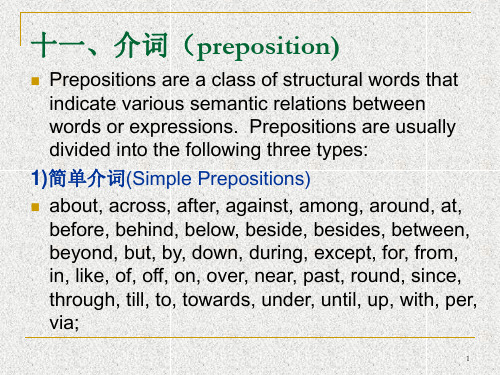
Prepositions are a class of structural words that indicate various semantic relations between words or expressions. Prepositions are usually divided into the following three types: 1)简单介词(Simple Prepositions) about, across, after, against, among, around, at, before, behind, below, beside, besides, between, beyond, but, by, down, during, except, for, from, in, like, of, off, on, over, near, past, round, since, through, till, to, towards, under, until, up, with, per, via;
3
determined by the noun or pronoun that follows, eg: Joe was very disappointed at not finding her at home. His parents will be disappointed with her if she fails the exam.
1
2)合成介词(Compound Prepositions) inside, into, onto, out of, outside, throughout, upon, within, without; 3)成语介词( Phrasal Prepositions) according to, along with, apart from, as for, as to, because of, by means of, in front of, in spite of, instead of, in accordance with, on account of, on behalf of, owing to, due to, together with, up to, with regard to next to, prior to,etc.
介词--盖老师英语

介词--盖老师英语介词+代词(代词一定用宾格);介词+动词(动词一定是ing形式)介词短语只要超过2个单词,一般放在名词的后面介词短语作定语时,避免头重脚轻只能放在被修饰的名词之后。
in大/at小的区别:at所在地有具体的人,如学校。
in所在地没有具体的人,如北京等1、介词的主要用法: 介词是一种虚词,不能独立使用。
介词之后一-般有名词或代词(宾格)或相当于名词的其他词类、短语或从句作它的宾语,即构成介词短语。
有些介词是由两个以上的词构成的短语介词。
如: out of(从...中出来),because of(因为),away from(距离...),on top of(在...顶上),ever since(自,从...):现在完成时的标志词next to(在...隔壁):==besideaccording to(根据..) in front of(在...前方)等.。
2、分类地点(位置、范围)介词:above在...前(靠前或上,不一定是正上方)与below对应about在..附近:不远处(还有关于的意思)across在...对面after在...后面against倚着...,along在...近旁:沿着...among在...中间:3者以上around在...周围:一般放名词之前round在...周围:一般放名词之后或单独使用at在...处:小地点/小时间before在... 前behind在..后up在... 上面:below低于...beside在...旁边:不能加s,加了s就是除了什么的意思了between在...之间:2者之间by在..旁:和beside意思一样down在...下面from来自...in在... 里面:大的时间、大的地点inside在... 里面:比In更强调在里面near靠近...of在..之中on在... 上面out of在..之外outside在...外面over在.... 上方(垂直正上方)under在... 下方(垂直正下方)on top ofL在..顶部in front of在...前:in the front of(更密闭的空间里的前面)close to靠近: to后如果出现动词,要用动词ing形式;否则是加动词的原形in the middle Oof在...的中间,at the end Of在...的末端,等等。
初中英语语法方位介词ppt课件

A. in
B. on
C. to
D. at
句意为“看这面墙,墙上有一些画”。画在墙上,是指在墙的表面 上,应该用on。故选B。
高效上好每节课·快乐上好每天学
为深入学习习近平新时代中国特色社 会主义 思想和 党的十 九大精 神,贯彻 全国教 育大会 精神,充 分发挥 中小学 图书室 育人功 能
【典例4】 ( 2011山东烟台) —Can a plane fly _______ the Atlantic Ocean? —Yes, but it needs to go_________ the clouds for hours.
高效上好每节课·快乐上好每天学
为深入学习习近平新时代中国特色社 会主义 思想和 党的十 九大精 神,贯彻 全国教 育大会 精神,充 分发挥 中小学 图书室 育人功 能
【典例1】(浙江中考改编)
People _____ the southeast of China are in great need of water.
高效上好每节课·快乐上好每天学
为深入学习习近平新时代中国特色社 会主义 思想和 党的十 九大精 神,贯彻 全国教 育大会 精神,充 分发挥 中小学 图书室 育人功 能
易错点3
容易混淆的介词短语
高效上好每节课·快乐上好每天学
为深入学习习近平新时代中国特色社 会主义 思想和 党的十 九大精 神,贯彻 全国教 育大会 精神,充 分发挥 中小学 图书室 育人功 能
高效上好每节课·快乐上好每天学
为深入学习习近平新时代中国特色社 会主义 思想和 党的十 九大精 神,贯彻 全国教 育大会 精神,充 分发挥 中小学 图书室 育人功 能
6.其它方位介词
英语介词用法图解.ppt

• 原状because of,、 owing to、due to表语 形容词。
• under后接修、建中, of、from物、化分。
• before、after表一点, ago、later表一段。
• before能接完成时, ago过去极有限。
• since以来during间, since时态多变换。
•
on the first 1号
•
on the sixteenth 16号
•
on the second of January或on January the second 1
月2日
•
on a summer evening在夏天的一个夜晚
•
on Boxing Day在节礼日(圣诞节次日)
•
on New Year's Day在元旦
这位教师正用一支新笔批改论文。(有形)
• "Taking Tiger Mountain by Strategy" is a good opera.
< <智取威虎山> >是—出好戏。(无形)
• The product is separated by distilation into gasoline
and gas oil.这种产品是用蒸馏分离出气油和粗柴油。(表
• The belief is based on practical experience.这 种信念是以实际经验为基础的。
• Theory must be based on practice.理论必须以 实践为基础。
• The people in the south live on rice.南方人主食大米 。(靠)
- 1、下载文档前请自行甄别文档内容的完整性,平台不提供额外的编辑、内容补充、找答案等附加服务。
- 2、"仅部分预览"的文档,不可在线预览部分如存在完整性等问题,可反馈申请退款(可完整预览的文档不适用该条件!)。
- 3、如文档侵犯您的权益,请联系客服反馈,我们会尽快为您处理(人工客服工作时间:9:00-18:30)。
"Taking Tiger Mountain by Strategy" is a good opera.
< <智取威虎山> >是—出好戏。(无形)
The product is separated by distilation into gasoline
and gas oil.这种产品是用蒸馏分离出气油和粗柴油。(表
We'll be back in no time.我们一会儿就回来。
Come and see me in two days' time.两天后来看我。(从现 在开始)
after... (从过去开始)
小处at大处in
例:Li and I arrived at Heishan county safe and sound, all is well. Don't worry.李和我平安地到达黑山县,一切很好, 勿念。
怀着.......希望 in connection with和……有关 in contact with和……联系 in addition to除......以外 in case of倘若,万一 in conflict with和......冲突 in force有效的,大批 in depth彻底地 in regard to关于 in the neighborhood of大约、
at the weekend 在周末
阳光、灯、影、衣、冒in,
即在阳光下,在灯下,在树阴下,穿衣、着装、
冒雨等都要用in。
例:Don't read in dim light.切勿在暗淡的灯光
下看书。
They are reviewing their lessons in the bright
light.他们在明亮的灯光下复习功课。
The length is measured in meter, kilometre, and centimetre. 长度是以米、公里、厘米为单位来计算的。 (同上)
特征、方面与方式、心情、成语惯用in
特征或状态:
例: The Democratic Party was then in power.那时民主
in the evening在晚上
in the day在白天
at黎明、午、夜、点与分
例: at dawn, at daybreak在黎明时候
ห้องสมุดไป่ตู้
at noon在中午
at night在夜间
at midnight在午夜
以上短语都不用冠词
at six o'clock 在6点钟
at 7:30 (seven thirty) 在7点半
介词用法图解
• 将来时态in...以后,小处 at大处in。
• 有形with无形by,语言、 单位、材料in。
• 特征、方面与方式,心情 成语惯用in。
• 若与数量词连用,混合使 用亦无关。‘
• beyond超出、无、不能, against靠着,对与反。
• besides,except分内外, among之内along沿。
有形with无形by,语言、单位、材料in
例:The workers are paving a road with stone.工人们
正用石子铺路。(有形)
The teacher is correcting the paper with a new pen.这
位教师正用一支新笔批改论文。(有形)
党执政。
They found the patient in a coma.他们发现病人处于
昏迷状态。
如下成语惯用in 例如:in all总计 in advance事前 in the meantime与此同时 in place适当地 in hopes of(或in the hope of)
示方式、手段、方法——无形)
I really can't express my idea in English freely in-
deed.我确实不能用英语流利地表达我的思想。(表示某
种语言用in)
The kilometer is the biggest unit of length in the metric system.公里是米制中最长的长度单位。(表示度、量、 衡单位的用in )
• 与之相比beside,除了last but one。
复不定for、找、价、原,对、给、段、去、为、作、赞。
快到、对、向towards,工、学、军、城、北、上、南。
but for否定用虚拟,复合介词待后言。
ing型由于鉴,除了除外与包合。
之后、关于、在......方面,有关介词须记全。
the woman in white (black, red, yellow)穿着白 (黑、红、黄)色衣服的妇女
in uniform穿着制服
将来时态in...以后
例: They will come back in 10 days.他们将10天以后回来。
I'll come round in a day or two.我一两天就回来。
in内to外表位置,山、水、国界to在前。
如大体掌握如上介调用法口诀,就不易出错。当然,至于介词的详尽
用法,同形词又是连词及副词等内容此章不讲。下面对该口诀分别举例帮
助你理解消化。
早、午、晚要用in
例:in the morning在早上
in the afternoon在下午(泛指下午);on the afternoon 特指某一下午
• 同类比较except,加for异 类记心间。
• 原状because of,、owing to、 due to表语形容词。
• under后接修、建中,of、 from物、化分。
• before、after表一点, ago、 later表一段。
• before能接完成时,ago过去 极有限。
• since以来during间,since时 态多变换。
at half past eleven 在11点半
at nine fifteen 在9点15分
at ten thirty a.m. 在上午10点30分
也可以写成
seven to five 5点差7分(半小时以上)
five minutes after two 2点过5分
at a quarter to two 1点45分
